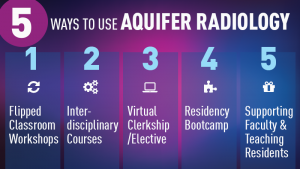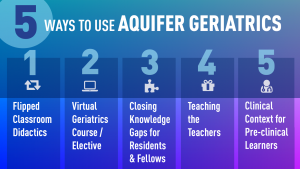Educator-to-Educator Tips & Strategies
Find out how your peers are making the most of Aquifer cases and teaching tools.
Find out how your peers are making the most of Aquifer cases and teaching tools.

Aquifer cases are a staple assignment in many clinical … Read more

Students provide consistently high rankings for Aquifer as reported in our five-star rating feedback data, but how and when cases are integrated into the curriculum can have a significant impact on their learning. Find out what themes emerged when we ask students what methods are most effective–and discover practical tips for assigning Aquifer cases based on student feedback.

Students provide consistently high rankings for Aquifer as reported in our five-star rating feedback data, but how and when cases are integrated into the curriculum can have a significant impact on their learning. Find out what themes emerged when we ask students what methods are most effective–and discover practical tips for assigning Aquifer cases based on student feedback.

WISE-OnCall is used by programs across medical and health professions education to help learners diagnose and manage clinical situations they are likely to encounter on clinical clerkships, advanced sub-internships, and during the transition to residency or practice. Here are some successful integration strategies that we’ve heard from faculty users…

Aquifer High Value Care, a free course available to all … Read more

WISE-OnCall is used by programs across medical and health professions education to help learners diagnose and manage clinical situations they are likely to encounter on clinical clerkships, advanced sub-internships, and during the transition to residency or practice. Here are some successful integration strategies that we’ve heard from faculty users…

We all know that every student will have a slightly different experience in each of their supervised clinical practice experiences (SCPEs). At our program, we’ve been using Aquifer cases to augment learning, build key communication skills, and supplement clinical experiences to meet ARC-PA standards.

We all know that every student will have a slightly different experience in each of their supervised clinical practice experiences (SCPEs). At our program, we’ve been using Aquifer cases to augment learning, build key communication skills, and supplement clinical experiences to meet ARC-PA standards.

WISE-OnCall is used by programs across medical and health professions education to help learners diagnose and manage clinical situations they are likely to encounter on clinical clerkships, advanced sub-internships, and during the transition to residency or practice. Here are some successful integration strategies that we’ve heard from faculty users…

WISE-OnCall is used by programs across medical and health professions education to help learners diagnose and manage clinical situations they are likely to encounter on clinical clerkships, advanced sub-internships, and during the transition to residency or practice. Here are some successful integration strategies that we’ve heard from faculty users…

Whether you’re searching for ways to engage students in virtual learning, revamping a stale lecture, or building a new didactic session, flipping the classroom around Aquifer cases is a powerful way to engage your students and help case-based learning stick. Check out different ways that medical educators are integrating Aquifer cases into their pedagogy…

In our 12-week pediatrics course for first-year PA students, we use Aquifer cases as a framework for four of our eight didactic sessions. Each Aquifer session includes an in-class lecture that covers the “don’t miss” diagnoses and difficult concepts for the topic area, followed by the students completing the related Aquifer case and the Aquifer Case Analysis Tool worksheet independently.

The 19 cases in Aquifer Radiology are designed to meet the needs of a wide range of learners and fit into many teaching modalities. Top radiology educators presented their successful strategies for integrating the cases in our recent webinar–find out what they shared…

The 27 cases in Aquifer Geriatrics are designed to meet the needs of a wide range of learners and fit into many teaching modalities. Top geriatrics educators from around the country presented their successful strategies for integrating the cases in our recent webinar–find out what they shared…

As the pandemic caused widespread disruption, Aquifer saw an unprecedented jump in the use of our cases–and many innovative ways to use the cases across curricula. Through our grant applications and many ongoing conversations with educators, we were able to identify trends and challenges and gather success stories and strategies to share.

Students provide consistently high rankings for Aquifer as reported in our five-star rating feedback data, but how and when cases are integrated into the curriculum can have a significant impact on their learning. Find out what themes emerged when we ask students what methods are most effective–and discover practical tips for assigning Aquifer cases based on student feedback.

We have integrated Aquifer Geriatrics cases in several different ways throughout our Geriatrics and Healthy Aging Curriculum thread. First-year students have a modified team-based learning session around the Dementia case. In the third year, cases prepare students for oral presentations on rounds…

When the COVID 19 pandemic interrupted our first-year medical students’ longitudinal primary care practicum (PCP), we needed to find an alternative that addressed one of its most important goals: helping students to focus the comprehensive history, exam, and documentation that they’re taught in the clinical skills course into a primary care-appropriate presentation and SOAP note. Our thoughts turned quickly to Aquifer, which is used by our internal medicine and pediatrics clerkships. Many Aquifer cases integrate well with the basic science topics our first-year courses, but most seemed a little too advanced for a mid-first year student. At the same time, senior students were eager to find ways to help, so we decided to combine Aquifer cases with ‘virtual’ peer teaching via videoconference.

If you want to use Aquifer cases as a clinical correlate in basic sciences classes just assign one case per week (e.g. pediatric case about cystic fibrosis in a genetics course; internal medicine case about anemia in hematology course). Students at UW have told me that this is about the right number of cases because the case content is complicated for early students. Students can work independently through the case and you can use it as context for discussion about how the basic science helps explain the clinical presentation–getting to the “why” behind how patients present as they do!

Many educators are wondering how to meaningfully engage their students in distance learning activities that create community and allow them to practice important patient care skills (while not seeing patients). While I have been doing peer-to-peer consults with educators around the country about using Aquifer cases in their curriculum, I stumbled into a helpful reframe that seems to be unlocking people’s creativity: Aquifer cases (yep…more than 170 of them!) are virtual standardized patients. Wait…what?